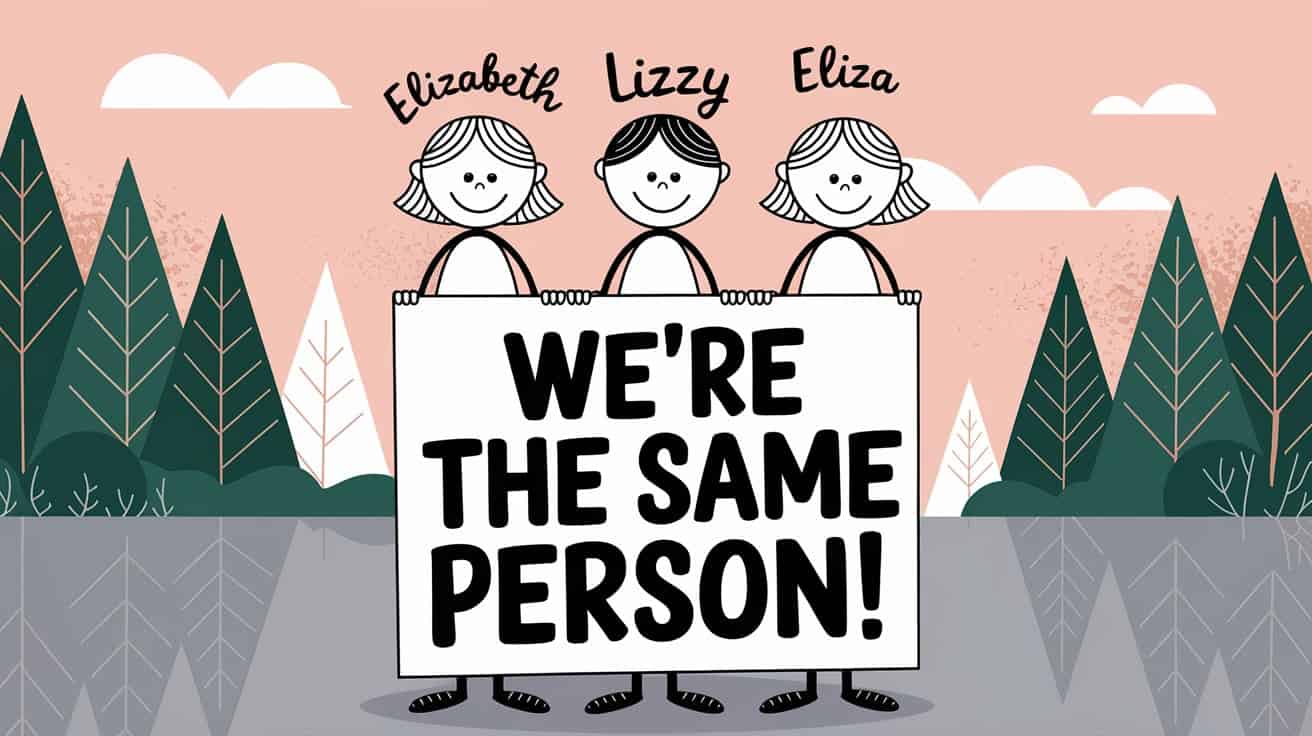Let’s cut straight to the chase. Your ancestors are playing tricks on you. Dead serious.
Every time you think you’ve nailed down a family line, boom – someone’s got five different names. Same person. Different documents. Pure chaos.
Here’s the truth: mastering name variations isn’t just another genealogy skill. It’s the skill that separates the amateurs from the pros.
The Nickname Trap
Stop searching for “Elizabeth” and nothing else. You’re leaving money on the table.
Think about it. One woman. A dozen documents. She’s Elizabeth on her birth record. Lizzy in the census. Beth in her marriage certificate. Betsy in her kids’ baptismal records. And somehow “Eliza” in her death notice.
Same blood. Different ink.
And guess what? Your search engine doesn’t know they’re the same person. It can’t connect these dots for you. That’s your job.
The Immigration Name Game
Here’s where it gets wild.
Your great-grandfather didn’t just step off that boat with a perfectly preserved surname. Immigration officials weren’t court stenographers. They were overworked humans dealing with language barriers and unfamiliar accents.
The result?
One family name could spawn multiple variations. Each one official. Each one legitimate. Each one a potential dead end in your research if you’re not paying attention.
Müller became Miller. Kowalski transformed into Koval. Patronymics got butchered beyond recognition.
Read next: Strategies for Tracing Ancestors Through Immigration Records
The Phonetic Factor
Listen up. This is where most researchers drop the ball.
Literacy rates in historical records? Not great. Census takers? They wrote what they heard.
That’s why you’ll find:
- Phonetic spelling variations
- Regional dialect influences
- Straight-up misheard names
The key? Think like a detective. How would your ancestor’s name sound in their local accent? What variations could emerge from that pronunciation?
The Multiple Identity Mystery
Raw truth: Some of your ancestors lived double lives. Legally.
Not talking about criminals here. Just practical people adapting to their circumstances.
Women remarried. Men took jobs under anglicized names. Immigrants adopted “American” names for business while keeping their original names at home.
All legitimate. All documented. All waiting to derail your research if you’re not prepared.
The Documentation Dilemma
Here’s the kicker. Official documents aren’t always official.
Birth certificates got filed late. Marriage records got recorded with errors. Death certificates got filled out by grieving relatives who were guessing at details.
Each error. Each variation. Each “alternative fact” created a new thread in your family tapestry.
The Solution Framework
Time to get tactical.
- Create a master list of every possible name variation
- Document where each version appears
- Cross-reference against timeline events
- Look for patterns in specific record types
Simple? Yes. Easy? No.
The Technology Twist
Modern genealogy tools are powerful. But they’re not magic.
Wildcard searches exist for a reason. Use them.
Soundex algorithms? They’re your secret weapon against phonetic variations. But they’re just tools. Not solutions.
The real power lies in your ability to think laterally. To see connections. To recognize patterns.
The Verification Victory
Want the harsh truth? You’ll never be 100% certain about some name variations.
But you can build a case. Strong evidence. Multiple sources. Correlation with known facts.
That’s not failure. That’s genealogy.
Read next: Strategies for Resolving Conflicting Evidence
The Modern Challenge
DNA doesn’t lie. But names do.
Your genetic matches might be hiding behind unfamiliar name variations. That’s why understanding naming patterns isn’t just about historical research.
It’s about breaking through modern brick walls too.
See also: Steps to Take When You Hit a Genealogy Brick Wall
The Action Plan
Stop treating names as fixed points in history. They’re not.
Start treating them as evolving identifiers. Because that’s exactly what they are.
Document everything. Question everything. But most importantly: keep pushing forward.
Remember: Your ancestors didn’t care about making your research easy. They cared about living their lives.
Understanding how and why names changed isn’t just about better research. It’s about understanding their stories.
And isn’t that why we’re all here?
The game never ends. But now you know the rules.
Time to play.



Thanks Marc, I enjoy reading your articles. I have found going back to about 1520 my surname started as Hell, and about 10 more variations. Who would have thought that a simple 4 letter name would change so many times.
Great article. I have a perfect example of playing the name game in genealogy. I’d been researching our “Scottish” roots, according to my dad, for the better part of 15 years, always hitting that genealogist block wall with Edward Campbell, my great-great-great grandfather. An old family bible, census records, marriage records, and other historical documents copied by a distant relative of my dad’s aunt were sent to the Allen County, Indiana, Genealogical Society with her request to enter Edward Campbell into the Register of State First Families. You see, Edward traveled with Judge Benjamin Archer’s clan who migrated from Ohio to Fort Wayne in 1823. Edward married Archer’s daughter Sarah in 1832. But nowhere was found a clue as to who his parents were. The family bible noted his birthdate, January 12, 1802, and a notation that he was born in “Tar Bun” (Terrebonne) “Canady” (Canada). The only clue that something was amiss was that his marriage record indicated he had an alias… “Chomo.” Early census records indicated that Edward’s father was born in France. Hmmm… and then there’s my DNA that indicates a mere 3% Scottish ethnicity. Well, I’m pleased to announce, I’ve hurdled that wall. Evidently, the Campbell name, for our family, was born when Edward left Quebec. Since Edward couldn’t read or write, the ‘Chomo’ was a phonetic representation of his birth surname in that document that was completed by someone else. It took another recreational genealogist (who is a DNA match to me) to hire a pro to figure it out. Edward’s birth name… Edme Champeau. So, a presumed Scottish surname does not a Scotsman make! And that 3% Scottish ethnicity didn’t come from my Campbell root as I eventually found out.
Also some names may be the same for male and female. Willie is common for females in the South. Mother’s maiden name as first name for both. Then the names that differ by one letter – Frances vs Francis – easy to get that letter wrong. Translating from languages like Arabic, Chinese, Etc. My in-laws cane from Iraq and translated there name one way. A nephew in France spells it differently.
Beyond the common versions/diminutives of Elizabeth and Margaret, it would be worth mentioning nicknames for Mary that were common in the 1700s and 1800s but not so obvious today – Molly and Polly. This was very confusing to me in researching my husband’s ancestors – until I saw an article that mentioned that Molly was a nickname for Mary as was Polly (Cockney rhyming slang I assume).